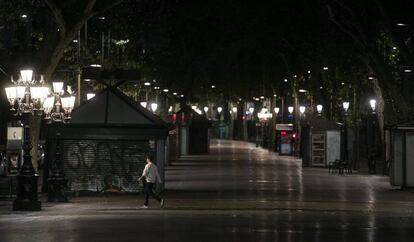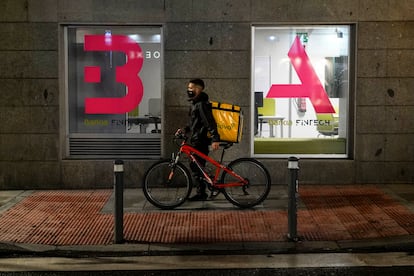Spain’s streets empty once again as country enters first night of curfew
There were few people to be seen in Madrid, Barcelona, Seville and Valencia on Sunday night after the Spanish government declared a state of alarm in a bid to contain the spread of the coronavirus


City streets across Spain were deserted on Sunday night after the Spanish government declared a state of alarm in a bid to contain the spread of the coronavirus. Under this decree, the government introduced a nighttime curfew for the entire country from 11pm to 6am, with regional premiers having a margin of one hour to bring forward or back the curfew times. Some regions, like Catalonia have announced that they will bring it forward to 10pm, while others like Madrid, will push it back until midnight.
Unlike the state of alarm declared in March at the start of the pandemic, which confined Spaniards to their homes and forced the closure of bars and restaurants, this time, the emergency measure only affects nighttime activity. Despite that, the feeling on Sunday night was similar to that of March.
In Madrid, there was no one on the streets – which was a problem for 27-year-old taxi driver Sergio Sánchez. He has always worked at night and did not think about changing his routine despite the nighttime curfew. He had been driving around the city for three hours without picking up a single passenger. “I have done zero trips,” he said. “I’m thinking about going home.”
The nighttime curfew is one of the main measures included in the state of alarm, which was approved by the Spanish Cabinet on Sunday morning. For the next 15 days, it will be mandatory across Spain, with the exception of the Canary Islands, which currently has the best coronavirus data in the country.

On Madrid’s popular Gran Vía avenue there was near complete silence. The only noise came from the street cleaners as they hosed down the pavement and the odd food delivery rider cycling to their destination. Gianfranco, from Venezuela, was one such driver. He had asked “some officials” if he could ride his bicycle through the city. They told him there was no problem. Unlike Sánchez, Gianfranco’s work was not affected by the curfew: he had made 19 deliveries that Sunday night. Demand for home-delivered food spikes when it’s raining. In a few hours, when things calmed down, he would take a bus to his home in Galapagar, 30 kilometers away.
Meanwhile, 32-year-old Angélica Paulo was waiting at a bus stop in the middle of nowhere, with lots of plastic bags by her side. She delivers empanadillas (dumplings) to restaurants in the center of Madrid and has to finish her job by midnight. She does not have any document to prove that’s her job, but she has prepared her response if she is stopped by the police: “I know a lot of things are banned now, but are you going to ban me from going home? That doesn’t make sense.”
In Barcelona, the scene was very similar. As in March and April, when the nightmare of the coronavirus pandemic began, the streets were empty. Spanish Prime Minister Pedro Sánchez announced a state of alarm at midday on Sunday, and just a few hours later, the Catalan regional government decreed a curfew starting at 10pm. When the clock struck 10pm, the streets of Barcelona became as empty as they were in the spring. Only police officers, taxi drivers, empty buses and homeless people could be found on the city’s main avenues. But much of Barcelona’s nightlife had already come to an end on October 16, when the Catalan government ordered the closure of all bars and restaurants in an effort to contain the rising number of coronavirus contagions.
In the past few days, young people have come to drink in the park. But not todayStreet vendor in Barcelona
“Where are you going?” That was what the few drivers on Paral·lel avenue were asked by the Catalan police force, the Mossos d’Esquadra. The officers had strategically set up several checkpoints to advise citizens of the new curfew rules. At the checkpoint on Paral·lel, which is Barcelona’s answer to Broadway, the officers were not issuing fines. From Monday, driving after curfew without a valid reason could result in a fine of between €300 and €6,000.
Further along the avenue, at the corner of Nou de la Rambla, a drug dealer was trying to be discreet, but soon became desperate and offered drugs to anyone walking down the street who did not look like a police officer. Next to him, a street vendor was trying to sell sandwiches and samosas. Neither of them had any success – there was absolutely no one on the street. “In the past few days, young people have come to drink in the park. But not today,” said the vendor, with a box filled with unsold sandwiches. On a road heading into Barcelona’s El Raval neighborhood, eight young people, formerly living under state care, were looking for a spot to spend the night. Under the curfew, homeless people are much more visible and infinitely more vulnerable.
Barcelona’s local police force knows where to find large gatherings of people. One of these spots is Àngels square in front of Barcelona’s Contemporary Art Museum. There, half a dozen youngsters were drinking while others did tricks on their skateboards. “You can’t be here,” the officers warned them. “Move along.” Afterwards, cleaners hosed down the square so they wouldn’t continue skating.
La Rambla is one of the noisiest places in the city during the day and a popular hangout at night. But on Sunday night there was not a single person in sight. Nor was there anyone to be seen in the Barceloneta neighborhood. The first night of the curfew had returned the city to the disquieting silence of the lockdown in spring.
The situation was nearly identical in Seville, in Andalusia, although the streets emptied out earlier. Bars in the city were closed at 10pm due to new restrictions and the only workers still inside them were cleaning up before going home. In the city’s historical old town, the silence was only interrupted by the rain and the sounds coming from inside homes. Some fast-food restaurants were open, but only for home deliveries. Three delivery riders were sharing a last slice of pizza as they waited for the final order. “With the curfew, we are going to have more work,” said María, as she checked the destination of her next delivery on her phone. The rain stopped after midnight. The two others, both wearing face masks, rode home on an electric scooter.
The Valencian regional government announced new restrictions before the state of alarm was decreed on Sunday. It introduced a curfew between midnight and 6am and ordered bars and restaurants to close by midnight. According to police and political sources, there were no significant incidents: establishments closed at the set hour and people went home. The National Police proposed a total of 224 fines for breaking the new restrictions, half of them for violating the curfew rules. The local police in Valencia set up checkpoints at different locations and reported several drivers for traveling without a justifiable reason after the curfew.
Based on reporting from Juan Diego Quesada, Alfonso L. Congostrina, Santiago Cañas Bonci and Ferran Bono.
English version by Melissa Kitson.
Tu suscripción se está usando en otro dispositivo
¿Quieres añadir otro usuario a tu suscripción?
Si continúas leyendo en este dispositivo, no se podrá leer en el otro.
FlechaTu suscripción se está usando en otro dispositivo y solo puedes acceder a EL PAÍS desde un dispositivo a la vez.
Si quieres compartir tu cuenta, cambia tu suscripción a la modalidad Premium, así podrás añadir otro usuario. Cada uno accederá con su propia cuenta de email, lo que os permitirá personalizar vuestra experiencia en EL PAÍS.
¿Tienes una suscripción de empresa? Accede aquí para contratar más cuentas.
En el caso de no saber quién está usando tu cuenta, te recomendamos cambiar tu contraseña aquí.
Si decides continuar compartiendo tu cuenta, este mensaje se mostrará en tu dispositivo y en el de la otra persona que está usando tu cuenta de forma indefinida, afectando a tu experiencia de lectura. Puedes consultar aquí los términos y condiciones de la suscripción digital.








































